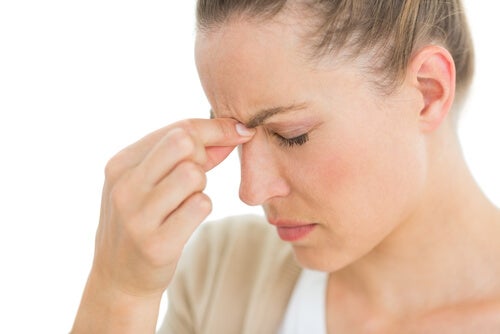Since most tend to be indicators of complications, we should be very aware of these pains and not overlook them so they do not evolve into something more serious

All of us have experienced pain at random, mysterious and sometimes persistent, sometime in our lives. Most of us don't give importance to them and, in general, pain comes out of the same way he came by itself and without any explanation. However, there are 10 mysterious pains that you should not ignore. Continue reading to know them.
Although not all the pain that you feel are indicators of an extreme emergency, some mysterious pains should simply not be ignored. Although few people are excited to go to a doctor, few doctors are enthusiastic about the treatment of a medical emergency that could have detected or treated before the problem getting worse in a matter of life or death. Then, what mysterious pains we must ignore?
1. more than the pain in the chest
Although this section focuses on diseases of the heart, chest pain is not the only indication that something is wrong. Imagine this scenario: it's a hot summer day and you're sweating by cutting the lawn. You stop to clean your face, when suddenly the jaw starts hurting. Everyone has you trained to worry with the chest pain. So you think that that happens to you is nothing. You tightened jaw with force during a cause of stress in the workplace.Unfortunately, sore jaw could be a sign that your heart is stressing. The pain in the jaw could serve as a warning of an impending heart attack or a signal that one just happened.
The pain of a heart attack often manifests itself in different parts of your chest: the shoulder, arm, abdomen, lower jaw or throat. If you experience a sudden pain in the shoulder or jaw area stop doing what you're doing, alert someone and seeking medical attention.
2. pain in the low back

Low back pain is very common, but it can be a signal of something more than sore muscles. Sometimes, back pain is a symptom associated with kidney problems. Low back pain can be linked to the formation of a kidney, stone that usually clears up (painfully) on their own. If it infects the kidney, swells, causing discomfort in the lower back. If a kidney tumor has grown enough, it can cause pain in the lower back, also.
3. severe abdominal pain
Occasionally, there is a clear cause for abdominal pain. Problems with nearby, such as the kidneys, lungs or cervical organs could result in abdominal discomfort. Pain in the right lower abdomen can mean that your appendix is inflamed and that means that you need a quick surgery.Pain in the right upper abdomen can be a sign of a problem with your gallbladder. Upper abdominal pain (together with upper back pain) can be a sign of pancreatitis, an inflammation of the pancreas. Abdominal pain may also point to an intestinal obstruction. If it is not immediately, this can result in the death of intestinal tissue, and other problems. And, finally, an inflammation of the liver due to hepatitis may cause excruciating pain in his gut.
4. calf pain
Calf pain often marks the day after a day (or a long climb up the steep stairs). But sometimes pain in the calf, especially when it is not tied to any type of injury, can mean that something else is wrong.The leg has a network of arteries and veins that move blood and from the muscle and heart. The veins that can be seen under the skin are called superficial veins and move blood into the deep veins. Small valves inside the veins prevent blood flowing the wrong way. However, clots due to a rupture can be formed into the vein, it is of a deep vein thrombosis (DVT), which may cause calf pain and swelling of legs.
5 tingling in arms and legs

If ever you've left the cross-legged for too long, you've probably experienced a feeling of almost painful tingling in legs and feet caused by the decrease of the blood circulation. Fortunately, tingling goes away quickly once since standing and move.
However, If your feet or hands feel this way, even when you have not bent you for too long, could be a sign of damage to the nerves. Symptoms such as tingling, numbness and a burning sensation, point to peripheral neuropathy.
6 general body pain
If you have pain in a certain part of your body it indicates that something in that area needs attention. You may have Fibromyalgia, a mysterious disease that results in aches and pains and affects more women than men. Fibromyalgia seems to give rise to an increase in the sensitivity to physical pressure or pain, and often involves difficulty sleeping.It is incredible, but depression can also cause headaches at random and otherwise unexplained in various parts of your body. This may manifest itself in the form of back pain, headaches and increased sensitivity to pain.
7 testicular pain
Never should ignore testicular pain, since it often indicates a condition that could worsen if ignored for too long. Anything from a hernia of cancer can cause testicular pain. The spermatic cord can be distorted, causing testicular torsion.Inflammation of the epididymis, a coiled tube located on the back of each testicle which serves as a system of storage and delivery of sperm, can also cause testicular pain. If the discomfort in the testicle accompanies a strange sensation, you likely have varicose veins, known as varicoceles.
8 strong headaches

While the headaches often seem to come out of nowhere, some headaches down incredibly fast, pounding like thunder. This mysterious and sudden pain could be a sign of something much more serious than a simple headache. If your headache causes an almost blinding pain, could be a sign of accident stroke or transient ischemic attack.
9 pain pelvic during sexual intercourse
One of the common symptoms of pelvic inflammatory disease is the pain or discomfort in the pelvic region during sexual intercourse. It is a bacterial infection of the uterus or the fallopian tubes resulting in tissue of red, swollen, and painful. Inflammation can cause scarring, which can lead to problems such as infertility.Pelvic inflammatory disease can also result in the formation of abscesses or chronic pelvic pain. Diseases of sexual transmission, most often Chlamydia or gonorrhea, or any source of bacteria that moves to the reproductive organs are the usual suspects of pelvic inflammatory disease. If it is not controlled, the infection can spread to the blood or other tissues of the body.
10. persistent joint pain
Osteoarthritis, general wear associated with age and wear and tear of cartilage that causes that the bones rub together, is a common source of pain in the joints, but it is not the only one. Stiffness and swelling of the joints can be caused by lupus, a disease that changed between periods of exacerbation and remission. Other lupus symptoms include fatigue, loss of hair, and fever.Hepatitis, a disease that affects the liver, also says joint pain as a symptom. On the other hand, it could be arthritis, but a more severe form of the same: rheumatoid arthritis. Rheumatoid arthritis is an autoimmune disease, which means that the immune system goes awry and attacks its own tissue.

0 comentarios:
Post a Comment